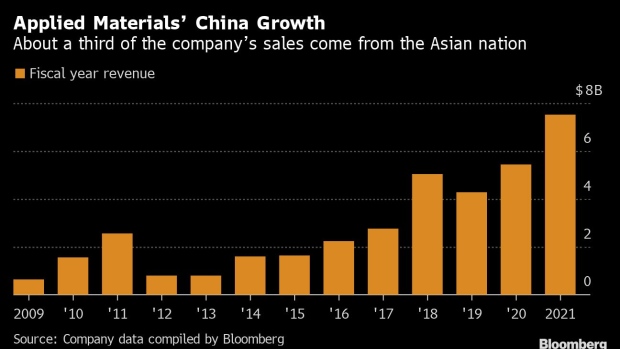Nov 17, 2022
Applied Materials Forecast Signals It Can Weather Chip Slowdown
, Bloomberg News

(Bloomberg) -- Applied Materials Inc., the biggest maker of chip-manufacturing equipment, gave a better-than-feared sales forecast for the current quarter as supply-chain improvements help offset an economic slowdown.
Fiscal first-quarter sales will be roughly $6.7 billion, up from a year earlier, the company said in a statement Thursday. That compares with an average analyst estimate of $6.34 billion.
The outlook brings fresh optimism that Applied Materials can weather a tumultuous stretch for the chip industry. The company, like its peers, is facing twin headwinds: a collapse in orders for some types of chips and an escalating standoff between China and the US. Large customers such as Micron Technology Inc. and Intel Corp. have said they will cut budgets to cope with weaker demand.
On the China front, Applied Materials expects to lose as much as $2.5 billion in fiscal 2023 revenue due to new trade restrictions. If the US government expedites licenses needed to sell in China, the impact could be $1.5 billion to $2 billion, the company said.
The outlook was reassuring enough to send Applied Materials shares up more than 2% in extended trading Thursday. They’d earlier closed at $104.45, leaving them down 34% in 2022.
Chief Executive Officer Gary Dickerson expressed confidence that Applied Materials could outperform the broader industry and said that untangling supply snags will help it fill more orders. Though the economic environment is worsening, chipmakers are still spending money on new technology that can help them keep up with competitors, he said.
“That race is relentless for our customers,” he said.
Read more: Micron warns that its outlook for 2023 has weakened
Fourth-quarter profit was $2.03 a share, excluding some items. Sales rose 10% to $6.75 billion in the period, marking the 12th straight quarterly expansion. Analysts predicted a profit of $1.68 a share and revenue of $6.38 billion.
In October, the Santa Clara, California-based company slashed its forecast for the fourth quarter, warning that the new export regulations would reduce sales by about $400 million. That hit will rise to $490 million in the current period, Applied Materials said.
As Chinese customers prove to the US government that their plants and products don’t violate the new restrictions -- or alter their plans to make sure they don’t -- Applied Materials should be able to increase shipments to the area, Chief Financial Officer Brice Hill said.
The Biden White House announced the latest export curbs Oct. 7, part of a campaign to halt China’s ability to develop the most advanced chips and equip its military. Applied Materials and a handful of companies -- US peers KLA Corp. and Lam Research Corp., the Netherlands’ ASML NV and Japan’s Tokyo Electron Ltd. -- totally dominate the market for machines needed to make semiconductors. In addition to imposing rules on US companies, the administration is negotiating with European and Japanese governments to get them to do the same with their businesses.
Read more: Chip industry braces for ‘heavy blow’ from China rules
The restrictions come at a tough time for the industry. After shortages during the pandemic, chipmakers had rushed to build new production. But now companies are looking to trim their budgets. The demand for PC-related chips has fallen as customers shun big-ticket purchases, and that’s weighed on chip stocks. The Philadelphia Stock Exchange Semiconductor Index, a key benchmark, has dropped 31% this year.
Companies such as Applied Materials and Intel can’t easily walk away from China, which is the biggest single market for their products and part of a global supply chain for electronics.
Like other tech companies, Applied Materials also is reining in job growth. The company is limiting hiring to “strategic positions,” it said Thursday.
--With assistance from Debby Wu.
(Updates with finance chief’s comments in 10th paragraph.)
©2022 Bloomberg L.P.





